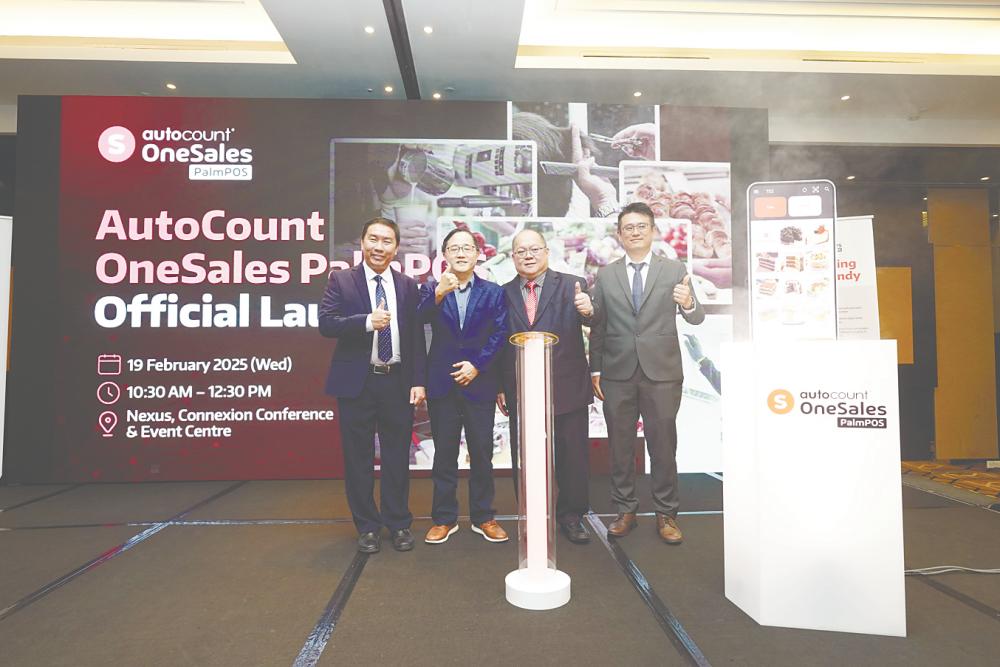KUALA LUMPUR: Small and medium enterprises will have no choice but to adopt e-invoicing as compliance deadlines approach, despite initial reluctance.
AutoCount Dotcom Bhd managing director YT Choo said e-invoicing adoption among SMEs, particularly micro SMEs, remains slow as many are holding back in hope of last-minute policy shifts.
“But SMEs will come on board as compliance becomes unavoidable. A lot of SMEs are complaining about the challenges and uncertainty of onboarding, but from what we’ve seen, it’s not difficult as long as they put in some effort to learn,” he told reporters today after the launch of AutoCount OneSales PalmPOS, a mobile point-of-sale (Mobile POS) solution designed to simplify e-invoicing adoption for micro SMEs.
AutoCount has estimated that more than 1.5 million companies with annual revenue between RM150,000 and RM25 million in the next two to three years have to comply with e-invoicing.
The company anticipates at least 10,000 subscriptions to its OneSales PalmPOS before July 1. Currently, it has 216 users mostly dealers or accountants who have accessed the system.
Choo said e-invoicing can streamline payment collection by integrating it directly with sales records.
“This means businesses can use their invoicing data alongside bank financial statements to secure loans for expansion. Previously, this was not possible because small traders had no verifiable source of income beyond bank statements.”
He noted that e-invoicing provides SMEs with a legitimate and traceable financial record, which strengthens their credibility when applying for loans.
“By combining Inland Revenue Board-submitted data with financial statements, SMEs can improve their chances of obtaining financing to expand their business, open new stores, or establish new outlets. In this sense, e-invoicing should be encouraged among small businesses looking to grow, as it provides a verifiable income source that supports expansion efforts,” Choo said.
AutoCount’s launch of PalmPOS reflects its commitment to supporting Malaysia’s MSME sector in embracing digital transformation. By integrating PalmPOS with AutoCount Cloud Accounting, the company offers a complete ecosystem that enables small businesses to save time, reduce errors, and streamline financial reporting.
Choo said AutoCount OneSales PalmPOS solution addresses challenges faced by small businesses, including the lack of familiarity with digital tools, the cost of new technology, and the operational disruptions associated with manual e-invoicing processes.
“Our goal is to empower micro SMEs with the tools they need to succeed in the digital economy,” he said. “PalmPOS is a game-changer for small businesses, making e-invoicing compliance simple, affordable, and accessible.”
PalmPOS simplifies e-invoicing compliance by allowing businesses to submit consolidated e-Invoices directly to the Inland Revenue Board.
Choo said, “The system integrates with e-wallet providers such as Boost, with more popular e-wallets and banks to be added soon, enabling automatic transaction recording. Real-time payment notifications and automated sales recording further enhance efficiency, freeing businesses from manual data entry.”
With e-invoicing compliance around the corner, solutions such as PalmPOS could ease the transition for SMEs, ensuring they stay competitive in Malaysia’s digital economy.
The Inland Revenue Board has outlined a phased implementation for mandatory e-invoicing:
From Aug 1, 2024, businesses with an annual turnover exceeding RM100 million are required to adopt e-invoicing. From Jan 1, 2025, the mandate extends to businesses with annual turnovers between RM25 million and RM100 million. From July 1, 2025, all remaining businesses, including SMEs with turnovers below RM25 million, must comply with e-invoicing requirements.









